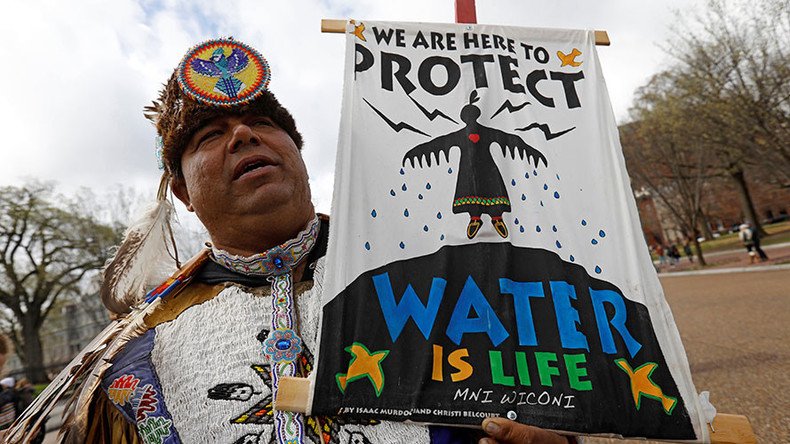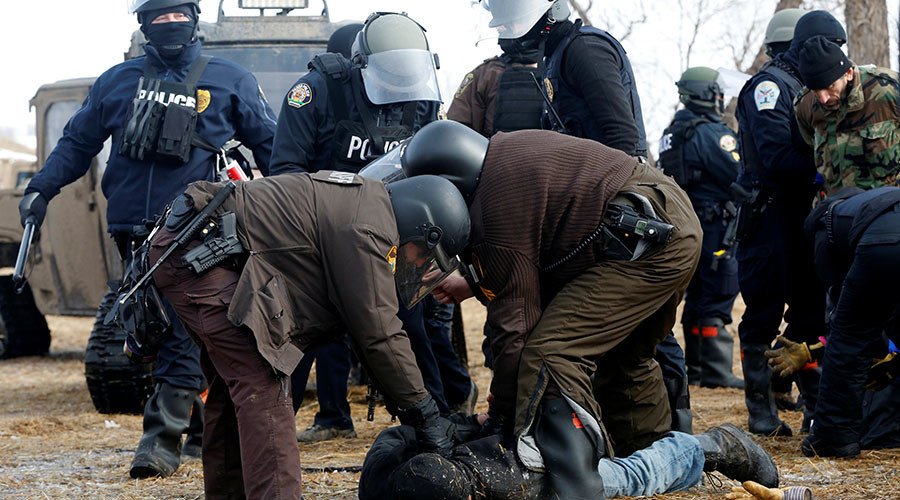Private security firm compared DAPL protesters to 'jihadist insurgency' – leaked documents

A private security firm which started out as a US military contractor and has been hired by the controversial Dakota Access Pipeline (DAPL) to counter indigenous activists protesting its construction, has used "military-style counterterrorism measures," the Intercept reports.
The online publication claims it has obtained over 100 internal documents of the TigerSwan security firm, leaked by one of its contractors, and has studied more than 1,000 documents via public records requests. The papers "reveal that TigerSwan spearheaded a multifaceted private security operation characterized by sweeping and invasive surveillance of protesters," it said.
The Intercept says the information provides "the first detailed picture" of the former US military and State Department contractor's "military style" methods. Its report claimed that the firm hired by Energy Transfer Partners treated the anti-project protesters as jihadists.
‘They will kill if necessary’: Historian scolds crackdown of DAPL protest (VIDEO) https://t.co/NtxzFbQhfJpic.twitter.com/2IeDmwXIgW
— RT America (@RT_America) November 24, 2016
In its internal communications, the indigenous-led movement who call themselves water protectors and who tried to prevent the construction of the pipeline, is described by TigerSwan as "an ideologically driven insurgency with a strong religious component."
The movement "generally followed the jihadist insurgency model while active," one of the leaked documents reportedly said, with TigerSwan adding, "we can expect the individuals who fought for and supported it to follow a post-insurgency model after its collapse."
To counter opponents of the pipeline, the private security firm – which was set up "during the height of the war in Iraq" by a former commander in the elite Army special operations unit – has used all methods of intelligence and infiltration, the report said.

Helicopters and drones were deployed for aerial surveillance and radio eavesdropping had been initiated. One of the leaked papers also revealed "plans to obtain night-vision goggles, LRADs [Long Range Acoustic Devices], [and] body armor."
TigerSwan's intelligence-gathering teams also reportedly infiltrated activist circles in various states by "using false names and identities," and forwarded the data to their employer. The firm has also reportedly targeted the movement through a "counter-information campaign" on social media.
#DakotaAccessPipeline leaks 2 barrels of oil before becoming operational https://t.co/eGSUxLd4nMpic.twitter.com/EOuQ2aHYDb
— RT America (@RT_America) May 11, 2017
The leaked documents further showed that the firm "consistently describes the peaceful demonstrators using military and tactical language more appropriate for counterterrorism operations in an armed conflict zone," the Intercept reported.
The protesters have been described "as 'terrorists,' their direct actions as 'attacks,' and the camps as a 'battlefield'," the report said, adding, that the peaceful anti-pipeline movement has been "treated as a national security threat."
READ MORE: #NoDAPL: ING bank sells loan shares in controversial pipeline
"Particular attention" has been given to protesters of Middle Eastern descent, the report claimed, citing one of the leaked documents. "The presence of additional Palestinians in the camp, and the movement's involvement with Islamic individuals is a dynamic that requires further examination," one of the documents cited by the Intercept reads. “Terrorist type tactics or operations... cannot be ruled out,” the report goes on.
"To insinuate that our assumed faith is a red flag for terrorist tactics is another example of willful ignorance and the establishment's continued attempts to criminalize nonviolent protest and justify violence against it," Haithem El-Zabria, a Palestinian-American activist singled out in the reports, told the Intercept.
"As indigenous people, Palestinians stand in solidarity with other indigenous people and their right to land, water, and sovereignty," he said.
READ MORE: Norway pension fund divests from DAPL after pressure from indigenous Sami parliament
The leaked materials apparently revealed not only TigerSwan's "militaristic approach" in dealing with "the nonviolent water protector movement," but also showed that the private security firm "coordinated its efforts with local, state, and federal law enforcement."
TigerSwan operatives had met with law enforcement officials in Iowa and North Dakota, the Intercept said, citing the leaked internal situation reports, which are said to feature comments about the firm's "routine coordination and intelligence sharing with law enforcement." The firm "also aided prosecutors in building cases against pipeline opponents."
Having published the first batch of TigerSwan's leaked internal reports prepared in North Dakota, South Dakota, Iowa, Illinois, and Texas between September 2016 and May 2017, the Intercept said it plans to reveal more of the leaked materials in the coming weeks.
Energy Transfer Partners declined to comment, the Intercept said, while TigerSwan did not respond to a request for a response.
The DAPL protest movement, mainly led by the Native American tribes, had been attempting to shut down the construction of the pipeline for months. The multi-billion dollar project, designed to transport oil from North Dakota to Illinois while traversing several states, had been temporarily suspended during the Obama administration but came back into force shorty after Donald Trump took office.
Earlier in May, it was reported that the over 1,000 mile long pipeline had already had its first crude oil leak, with the incident sparking further outrage and renewed questions of environmental safety.















